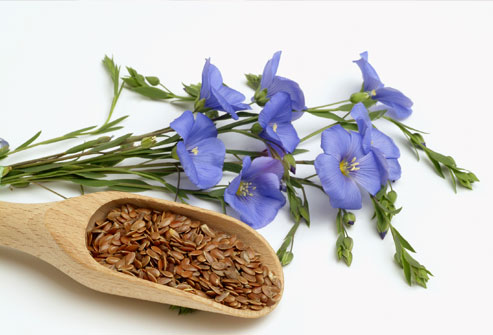Apologies for the not-so-exciting title (kinda sounds like something out of your high school chemistry book, right?). But I’m telling you: aside from the good mood boost you get after exercise, drinking flaxseed oil is the only health habit I’ve ever tried that actually produces instant results.
It all started back in high school. I was just starting to get into health and fitness, and I read about this seed that contains more alpha linolenic acid (ALA or LNA) – considered the most important of the omega-3 fatty acids – in the world. Now at the time I didn’t know too much about omega-3’s, but the whole thing sounded pretty impressive so I decided to give it a whirl.
 And I am not kidding you
And I am not kidding you
It felt like I drank some kind of magic potion.
I remember going to my high school track and just running lap after lap (which is especially impressive if you’ve ever seen me run). I was in a good mood, I had tons of energy and I couldn’t think of any other explanation besides the flaxseed oil!
Fast-forward a few years
My love affair with flaxseed continued, but over time life got crazy and we started to drift apart. (C’est la vie, non?) Sure, I’d still sprinkle the odd tablespoon of ground flaxseed into my scrambled eggs, but it just wasn’t the same. It wasn’t until last week, when I was looking for some extra energy, that I finally decided to buy another bottle.
And. Oh. My. Goodness.
The very first day, I had energy to spare (I fit in a workout and some errands after an extra long work day) and I was in a genuinely good mood! Now, I won’t dismiss the influence of a placebo-effect type mentality (believing something will work, so it does) but seriously: who cares?! All I know is this stuff gets the job done, son.
Now for the science
Omega-3 fatty acids are pretty impressive. They’ve been known to fight:
- Cancer
- High cholesterol
- Heart disease
- Arthritis
- Skin disorders
- Diabetes
- High blood pressure
- Cognitive decline
(You get the drift. Basically everything.)
But what really intrigues me is their effect on mood disorders…
Get ready for a lil cut and paste action
If you have time, I strongly recommend reading this 2006 American Journal of Psychiatry review article, Omega-3 Fatty Acids and Mood Disorders. If not, skimming through the following excerpt will work too (I put the super important parts in bold):
In the last 150 years, rapid expansion in Western populations has been associated with a change in diet, with omega-3 polyunsaturated fatty acids from fish, wild game, and plants being replaced by saturated fats from domestic animals and omega-6 polyunsaturated fatty acids from common vegetable oils (corn, safflower, and soybean) and other sources. These changes have resulted in a large increase in the ratio of omega-6 to omega-3 fatty acids in the general diet from 1:1 to more than 10:1. This has resulted in a high proportion of the common omega-6 fatty acid arachidonic acid, rather than EPA, in the cell membranes of most tissues, leading in turn to a high proportion of inflammatory eicosanoids… An increase in arachidonic acid also affects the production of EPA and DHA, owing to competition for metabolizing enzymes.
Such dietary changes in fatty acid intake have been held to have numerous pathological consequences. For example, epidemiological evidence from the U.S. Multiple Risk Factor Intervention Trial for 12,866 middle-aged men identified significant inverse relations between omega-3 levels and cardiovascular disease. In relation to depression, [multiple researchers have] suggested that the sharp rises in rates of depression and other neurological disorders in the 20th century are being fueled by increased consumption of vegetable oils rich in omega-6 fatty acids. Indirect support for that hypothesis emerges from data indicating high levels of inflammatory eicosanoids derived from arachidonic acid in both patients with unipolar depression and those with bipolar depression.
As epidemiological research has shown wide variation in the annual prevalence of major depression across countries, a dietary determinant has been considered; several epidemiological studies have examined possible links between fish consumption and mood disorders. The study results have been intriguing, and there have now been sufficient studies pursuing deficits in omega-3 fatty acids and treatment implications to encourage fine-focused etiological and treatment studies. As further evidence of the research domain’s importance, the National Institutes of Health conducted a workshop on the links between omega-3 fatty acids and psychiatric disorders in 1998.
The article goes on to reference studies that have found links between greater consumption of seafood (rich in omega-3’s) and lower prevalence rates of bipolar I, bipolar II, bipolar spectrum disorder, postpartum depression and major depressive disorder.
(Additional resources are linked in the reference section, below).
Back to flaxseed
So I debated sharing this video with you because it’s a pretty embarrassing mix of really nerdy material and half-realized concepts (I originally pictured the whole thing as a PSA-style silent film, so I dubbed some early 1920’s music… but then I realized there was too much information and I needed a voice-over… so I added dialogue with an old-school microphone effect… and, well, things just went downhill from there…). But then I figured, what the heck. Most people probably won’t make it to the end of this article anyways ;)
Editor’s note: In my defense, this video was created as an assignment for Dr. Shigehisa Kuriyama’s class, “Medicine and the Body in East Asia and Europe” (Harvard, 2012) so it’s not like I just sit around making flaxseed movies in my spare time. (Not sure if that makes it any cooler? lol)
And hey, in the immortal words of Alex from Modern Family:
Hehe just kidding :) Hope you enjoy!
Anyone else a fan of flaxseed?
Any plans to pick some up soon?
Which do you prefer: flaxseed oil or ground flaxseed?
References
Ehrlich, S. (2011). Omega-3 fatty acids. University of Maryland Medical Center: Complementary and Alternative Medicine Guide. Retrieved: June 14, 2014.
Noaghiul, S. & Hibbeln, J.R. (2003). Cross-National Comparisons of Seafood Consumption and Rates of Bipolar Disorders. American Journal of Psychiatry, 160: 2222-2227. doi: 10.1176/appi.ajp.160.12.2222
Parker, G., Gibson, N.A., Brotchie, H., Heruc, G., Rees, A-M. & Hadzi-Pavlovic, D. (2006). Omega-3 Fatty Acids and Mood Disorders. The American Journal of Psychiatry, 163(6). doi:10.1176/appi.ajp.163.6.969
Su, K-P., Huang, S-Y., Chiu, C-C. & Shen, W.W. (2003). Omega-3 fatty acids in major depressive disorder: A preliminary double-blind, placebo-controlled trial. European Neuropsychopharmacology, 13(4).
Stoll, A.L., Severus, W.E., Freeman, M.P., Rueter, S., Zboyan, H.A., Diamon, E., Cress, K.K. & Marangell, L.B. (1999). Omega 3 Fatty Acids in Bipolar Disorder: A Preliminary Double-blind, Placebo-Controlled Trial. Archives of General Psychiatry, 56(5). doi:10.1001/archpsyc.56.5.407



How much flaxseed oil do you drink?
Hi Samantha, I usually drink 2tbsp. a day. Hope this helps! :)
Thanks dear Jessica. May God bless you with more energy to spread the truth about flax seeds. All your efforts are beautiful.
With regards
Dr Satish
Thank you so, so much for your kind words! Your encouragement means a lot!
All the best,
Jessica
I would encourage you to research much more into flaxseed oil and ALA.
Your body LOVES Omega 3’s, but only when they are absorbed in the proper form and in the proper dosage. Research showed that ALA absorption prohibits EPA and DHA, which are the essential omega 3’s.
Effects on eye health from flax seed oil and ALA have been proved damaging, increasing your risk of macular degeneration by 49%.
Also, most store bought products are cleaned with an alcohol am not in the proper triglyceride form for your body to absorb.
Dear Jessica kindly let me know how you drink the flax seed oil? I mean with what do you add & when ? Is it early morning or after breakfast?
Also Pl tell me about your first experience…The sudden surge after flaxseed oil. How did u have it then? Thanks…
Hi Dr. Satish,
I take the flaxseed straight up :) Just by itself! I usually take 1 (or sometimes 2) tablespoons in the morning before eating – hope this helps! And thanks so much for reading!
Thanks for the reply. May God bless you with such beautiful experiences as you had in your childhood. Running on & on with power of flax seed oil. That was a revelation.
Can you share what brand you take? I’ve been taking an organic flaxseed meal and have instantly felt my mood lift for hours!
But I would love to try the oil!
Thank you for the wonderful article and video!
You’re so welcome! I use Bob’s Red Mill (for the meal) and Spectrum for the oil :)
Hi so I started taking a tsp or so of oil a dAy in 2006 or so.
I immediately. Of iced the way that it curbed my appetite for the day.
I then. Of iced over the next few weeks the way it reduced my chocolate sugar cravings.
At the time I was late 20’s and noticed the change in mood swings and mood decline close to menstrual cycle. Something i hadn’t had trouble with in the past. Each month I knew it was pms time because I was hit with negative thoughts that weren’t my usual. So after tKing flaxseed oil I noticed the next month my cycle started without any heads up or indication from the mood swings. I was shocked. I traced it back to the flaxseed oil and found correlating information. I noticed tKing a spoon of that each day plus extra cardio endorphins helped fight off depression. Still love it today
Fascinating! Thank you so much for sharing! Wishing you continued health and wellness :)
Thank you so much, I owe you. I have consumed flaxseed and sesame seed. After consumed both,I manage to curb my schizo and bipolar symptoms. I did not that flaxseed that worked for me. I quit flaxseed, then continued to consume sesame seed. My symptoms rebound. Now I know. It was flaxseed that really work not sesame seed.